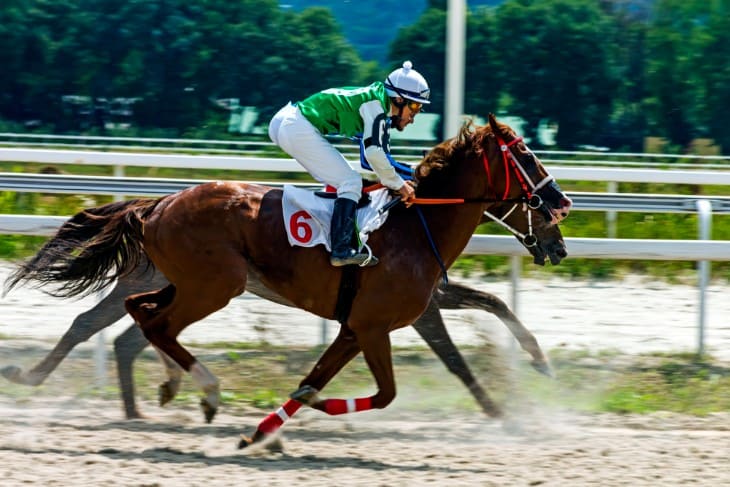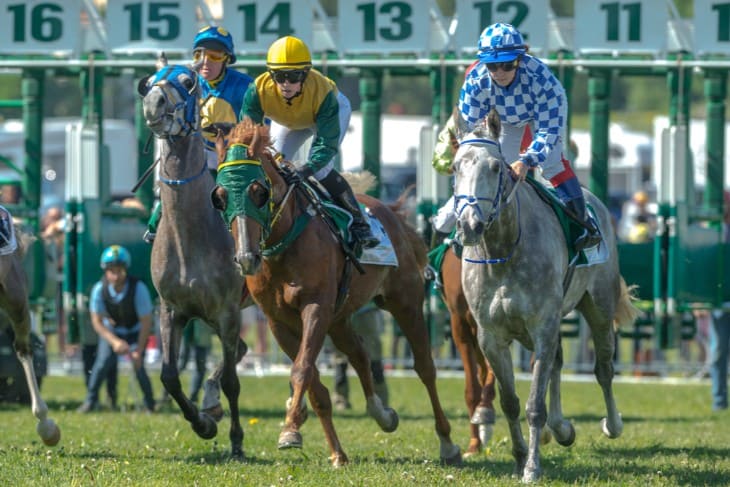- Key Factors Influencing Horse Racing Outcomes
- Analysing Race Track Conditions
- Understanding Horse Breeding and Pedigree
- The Impact of Betting Odds and Payouts
- Strategies for Analysing Past Performance Data
- The Influence of Weather on Horse Racing
- Importance of Race Strategy and Positioning
- Managing Risks and Expectations in Horse Race Betting
- Conclusion
Grand Slam betting in horse racing refers to a specific type of wager where the bettor predicts the winners of four major horse races, typically within a single season or a set timeframe. This form of betting is renowned for its high difficulty but equally high reward. Grand Slam bets are not merely about selecting a winner in a single race; they require a deep understanding of multiple races, each with its unique set of variables and challenges. The allure of Grand Slam betting lies in its combination of skill, knowledge, and a bit of luck, making it a tantalising prospect for seasoned punters and novices alike.
These bets often involve major races known for their prestige and history. In different regions, the specific races that constitute a Grand Slam can vary. For instance, in the United Kingdom, a traditional Grand Slam might include iconic races like the Cheltenham Gold Cup and the Grand National. The key is that these races are generally spaced out across the racing calendar, requiring bettors to maintain sustained engagement and analysis over an extended period. This long-term approach distinguishes Grand Slam betting from more straightforward, single-race wagers.
Key Factors Influencing Horse Racing Outcomes
In the realm of horse racing, several key factors significantly influence the outcomes of races, and by extension, the success of Grand Slam bets. The first and perhaps most crucial factor is the horse's form. This encompasses the horse's recent performances, training regime, and any known injuries or health issues. Horses in peak condition, with a history of strong performances, are generally favoured in betting. However, even a top-performing horse can have an off day, adding an element of unpredictability to the sport.
Another critical factor is the horse's lineage and breeding. Horses from a lineage known for stamina, speed, or agility are often considered more likely to perform well in races that suit those traits. For example, a horse bred from a line known for exceptional stamina may have a distinct advantage in longer races. Additionally, trainers play a pivotal role. Their skill in preparing the horse for the race, alongside their strategic decisions regarding pacing and positioning during the race, can significantly affect the outcome.
Analysing Race Track Conditions
The condition of the race track is a fundamental element that can greatly impact the outcome of a horse race. Factors such as the type of surface, track layout, and weather conditions on the day of the race must be carefully analysed.
- Surface Type: Horse racing tracks can vary in surface type, including turf, dirt, and synthetic materials. Some horses perform better on specific surfaces, influencing their chances of winning a particular race.
- Track Layout: The design of the track, including its length, width, and the presence of turns or slopes, can advantage or disadvantage certain horses. Knowledge of how a horse has performed on similar track layouts in the past can be a valuable predictor of its future performance.
- Weather Conditions: Weather can drastically change the state of a track. For instance, heavy rain can turn a turf track soft, favouring horses adept at running in muddy conditions. Conversely, a dry, firm track might benefit horses with a strong turn of speed.
Understanding and analysing these track conditions is crucial for making informed bets, especially in the context of Grand Slam betting where races occur at different venues and times of the year.
The influence of the jockey in horse racing is a critical aspect often overlooked by novice bettors. A skilled jockey can make a significant difference in a race's outcome, especially in high-stakes competitions like Grand Slam events. Jockeys bring not just their riding skills to the race, but also their ability to make split-second decisions based on their understanding of the horse, the track, and the competition. Their experience in previous races, familiarity with the horse, and ability to adapt to changing race conditions are invaluable assets.
Understanding Horse Breeding and Pedigree
The breeding and pedigree of a horse are fundamental factors that can indicate its potential performance in races. Horse breeding is a science and art, with breeders aiming to combine the best traits of both sire (father) and dam (mother) to produce offspring with superior racing abilities. A horse's pedigree provides insights into its potential for speed, endurance, and adaptability to different track conditions.
- Genetic Traits: Certain bloodlines are known for specific traits, such as sprinting speed or endurance. For instance, a horse descended from a line of successful long-distance racers may be more likely to excel in endurance races.
- Historical Performance: The racing success of a horse's ancestors can also be an indicator of its potential. A pedigree that includes multiple winning racehorses suggests a genetic predisposition to racing success.
- Breeder Reputation: The reputation and track record of the breeder can also influence a horse's potential. Established breeders with a history of producing successful racehorses are often more trusted in the racing community.
When betting on horse racing, especially for Grand Slam events, considering a horse's breeding and pedigree can provide valuable insights. It helps in assessing the horse's suitability for the specific conditions of the races included in the Grand Slam bet.

The Impact of Betting Odds and Payouts
Betting odds in horse racing are not just indicators of a horse's likelihood of winning but also a reflection of how the betting public views that horse's chances. Understanding odds is crucial in Grand Slam betting, as they directly influence the potential payouts. Higher odds suggest a lower probability of winning but offer larger payouts if the horse does win, while lower odds indicate a higher probability of victory but yield smaller payouts.
- Fixed Odds: These are determined by bookmakers before the race and remain constant, regardless of how betting patterns change.
- Parimutuel Betting: Here, odds fluctuate based on how the betting public wagers. The total amount bet on each horse determines the final payout.
Payouts in horse racing betting can be significantly affected by the type of bet placed. Grand Slam betting, with its focus on multiple races, often involves complex bets like accumulators, where the winnings from one race roll over to the next.
Strategies for Analysing Past Performance Data
Analysing past performance data is vital in making informed betting decisions, especially in Grand Slam betting where long-term consistency across multiple races is key. This involves examining a horse's previous race results, but it goes much deeper than just looking at wins and losses. Bettors should consider a range of factors from past performances to gauge a horse's potential in upcoming races.
Firstly, the consistency of a horse's performance over time is crucial. A horse that consistently places high or shows steady improvement may be a safer bet than one with erratic results. This includes looking at performances under similar conditions to the upcoming race, such as track type, race distance, and competition level.
Secondly, it's important to consider the context of past performances. For example, a horse may have finished in a lower position due to external factors such as poor track conditions or interference during the race. Understanding the reasons behind a particular performance can provide deeper insights into a horse's true potential and ability to handle different racing scenarios.
The Influence of Weather on Horse Racing
Weather conditions play a significant role in the outcomes of horse races, impacting not just the race track but also the performance of the horses and the strategy employed by jockeys. For instance, heavy rain can lead to a softer, more challenging track surface, favouring horses adept at running in muddy conditions. Conversely, dry, hot weather can result in a firmer, faster track, benefiting horses with strong sprinting abilities.
The effect of weather extends beyond the condition of the track. It can also influence a horse's comfort and performance. Some horses may perform well in cooler conditions, while others thrive in warmer weather. Understanding how different horses have performed under varying weather conditions in the past can provide valuable insights when placing bets, especially in the context of Grand Slam events, which may span different seasons and weather patterns.

Importance of Race Strategy and Positioning
The strategy employed in a horse race, both by the jockey and the trainers, is a critical factor in determining the outcome. This encompasses decisions made before and during the race, including positioning and pacing. Effective race strategy requires a deep understanding of the horse's strengths and weaknesses, as well as the dynamics of the field.
- Starting Position: The position from which a horse starts can influence its performance, especially in races with a large number of runners. Some horses perform better when they start from the outside, allowing them more space to manoeuvre, while others excel in an inside position, closer to the rail.
- Pacing Strategy: How a jockey chooses to pace the horse throughout the race can be decisive. Some races may call for an early lead, while others may benefit from conserving energy and making a late surge.
Jockeys must also be adept at reading the race as it unfolds, adjusting their strategy in response to the pace set by other runners and changing track conditions. This adaptability is particularly important in Grand Slam betting, where the high level of competition and varied conditions across multiple races demand a flexible, strategic approach to each event.
Managing Risks and Expectations in Horse Race Betting
Betting on horse races, particularly in the context of a Grand Slam, involves a considerable degree of risk and uncertainty. To manage these risks effectively, it is crucial to approach betting with a clear strategy and realistic expectations. One key aspect is diversifying bets. Instead of placing all funds on a single horse or race, spreading bets across different horses and races can mitigate potential losses.
- Setting a Budget: It's important to decide on a betting budget in advance and stick to it, regardless of wins or losses. This helps prevent overspending and reduces the financial risk involved.
- Understanding Betting Options: Familiarising oneself with various types of bets, such as win, place, show, or exotic bets, allows for more informed decision-making and helps in choosing bets that align with one's risk tolerance.
It's also essential to manage expectations. While winning a Grand Slam bet can be lucrative, the odds are typically high due to the complexity of accurately predicting multiple race outcomes. Therefore, bettors should approach Grand Slam betting with the understanding that wins may be infrequent but potentially significant.
Conclusion
In conclusion, successful betting in Grand Slam horse racing requires a comprehensive understanding of various factors including the horses, track conditions, weather, and the strategies employed by jockeys and trainers. A thorough analysis of these elements, coupled with prudent financial management and realistic expectations, can significantly enhance one's chances of success.
For more information:








